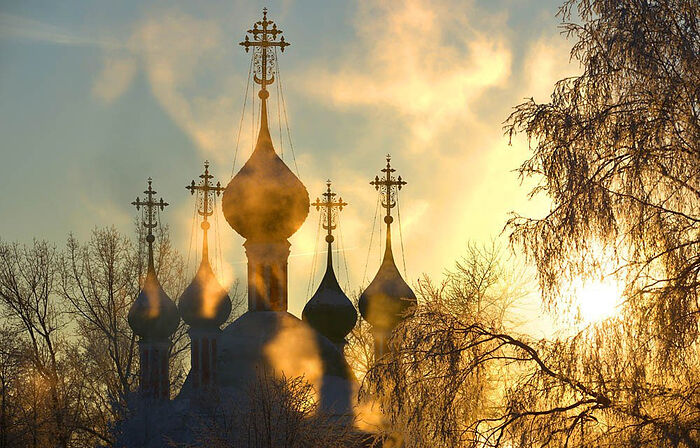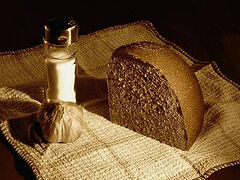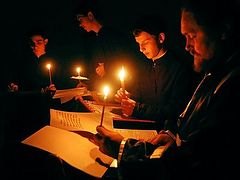The springtime of the Fast hath dawned,
the flower of repentance hath buddeth forth.
O brethren, let us cleanse ourselves from all impurity.
(Wednesday of Cheesefare Week, Vespers, Aposticha)
To every thing there is a season, and a time to every purpose under Heaven (Ecc. 3:1),
says the wise Preacher of the Old Testament Church—A time to weep, and a time to laugh …
A time to kill, and a time to heal; a time to break down, and a time to build up (Ecc. 3:4, 3).
Joyous is the radiance of the sun; sweet the lightness of the air; pleasant the warmth. But what would happen to the earth, to animate and inanimate creatures if the sun constantly shone over our heads, if the lightness of the air continued uniformly, if warmth invariably reigned? We would perish from the excess of what is naturally a great good. Therefore, it’s necessary for the good working of our natural forces that the heat be dissipated by the cold, the radiance of the sun be covered by clouds, the lightness of the air be covered by fog, the humidity of dew and rain, and the diverse blowing of both quiet and stormy winds.
As in the physical world, so it is in the moral and spiritual world. What would happen to our morals, to our hearts, to our spiritual dispositions if there were only celebrations and happiness shining around us? A great moral disorder would follow: Our thoughts would scatter, our spiritual disposition would darken, we would lose all moral strictness, our activity would weaken, and the usual course of our affairs would have become disordered. Therefore, the word of the wise one is true, that To every thing there is a season, and a time to every purpose under Heaven… A time to weep, and a time to laugh … A time to kill, and a time to heal; a time to break down, and a time to build up (Ecc. 3:1, 4, 3).
According to the spirit of Christian self-denial, demanding unceasing crucifixion of our passions, we need to know but one change—a change towards prospering in what is good; we must know one path amidst both favorable and unfavorable external conditions, that following our Divine Ascetic in the unceasing bearing of our cross, we might ascend from strength to strength, from temperance to patience, from patience to constant detachment, from everyday pleasures to spiritual, unseen pleasures.
But such is the weakness of our nature, that our external man demands sensual consolations. They’re not forbidden—they’re even permitted to calm and strengthen our weakened forces. Only we don’t know how to enjoy them. Going overboard in external consolations, we indulge in sensual pleasures, and being carried away by dissipation to the point of forgetting ourselves, we burden and weigh ourselves down with a multitude of harmful habits, inclinations, addictions. This is why our life, though it may look good from the outside, is inwardly filled with impurity before God, unrighteousness before men, and infidelity before our own conscience. So, most often, due to the excess of external freedom and sensual comforts of life, we fall into inner disorder, and secretly fall ill with grave, deadly ailments in our souls.
What must we do? We must heal ourselves with sorrows, lamentations, and renunciation of what led us to spiritual disorder, to a disorder of our life and affairs. And there is no other way to heal ourselves from the wicked inclinations and habits that possess us than by driving them out by what opposes them—driving out riotous thoughts with Divine thoughts, scatteredness with attention to ourselves, self-indulgence with abstinence, enfeeblement with the restraint of the senses, the corruption of the heart with its purification.
And the present time of the Holy Forty Days is the most favorable time for spiritual labors, for fighting against the flesh, for fighting against the temptations of the world, for battling against the rulers of the darkness of this world, against spiritual wickedness in high places (Eph. 6:12). The Great Fast is the most sacred labor for a Christian, which he fulfills according to the example of our Savior, Who fasted forty days and forty nights in the secluded wilderness. It is, as the Holy Fathers call it, a tithe, where we offer a tenth of the year to the Lord in the labors of abstinence and prayer, just as the sons of Israel, in fulfillment of the commandments of the ancient Law, brought a tenth part of everything they earned as a gift to the Lord God.
And will not our spirit be inflamed with a sacred zeal for spiritual labors when we think in light of the word of God, as it’s easy and sure to fight against the unseen enemies under the leadership of Jesus and with the shield of faith, wherewith ye shall be able to quench all the fiery darts of the wicked (Eph. 6:16)? How comforting it is, following our Divine Ascetic on the path of purification, to attain to the measure of Divine likeness! What blessedness it is to achieve inner peace, purity of conscience, union with Christ, brotherly communion even with those who hate us through victories in the Heavenly struggle! Truly, with reverent thoughts about the grace-filled sweetness and the salvific quality of spiritual labors, our spirit burns with the desire to labor together with our Savior and enter into a purifying endeavor against the passions that war against our soul.
And the spirit is willing, but the flesh is weak. When we come to the labors themselves, then our flesh, our outer man grieves and is burdened, weakens and becomes fainthearted. Therefore, when beginning an ascetic labor, we must constantly strengthen ourselves with attention, vigilance, and renunciation of temptations. Otherwise, on the very first steps of the path, we can deviate from the saving goal, change our good intentions, forget the holy time, lose our spiritual disposition, turn to our former path of a sensual, careless, scattered, intemperate life, smoldering in lusts. And by this, by darkening the light-bearing labor of spiritual work, we sorrow the Holy Spirit, we bring no gladness to our Savior, and we’re not only deprived of the fruits of spiritual acquisition, but we will suffer even greater spiritual losses.
To this end, having strengthened ourselves in the power of God with firm determination, we must constantly attend to ourselves, carefully guard ourselves in all that is dangerous for our outer and inner purity, arouse the fear of God in ourselves to the utmost, have meekness and humility in relation to others, and protect ourselves with diligent prayer in the morning, constant work in the daytime, and an impartial test of our conscience about how we handled our daily affairs.
Let us traverse the path of the Fast as the path of the grace-filled purification of our souls and bodies. Let us, with God’s help, exercise our body in the feat of temperance as much as we can, cleanse our soul with prayer, hold our senses collected, and above all, let us heal our main ailment and illness and curb and correct the passion that dominates in us, which possesses us.
If, throughout the feat of the holy Fast, the Lord helps us, as much as possible, to curb our corrupt tendencies, to stop our sinful habits, then most of all, He will also help us to weaken our main spiritual enemy, our ruling passion, and to curb and subject it to the fear of God and the voice of our conscience. O, the great mercy of God! Participating in the exploits of the salvific sufferings of our Lord as much as we can, when the joyful day of the Resurrection shines, we will be accounted worthy to hear in the inner sense of our souls the sweet voice of the risen Lord, saying, “Rejoice.”
Amen.




